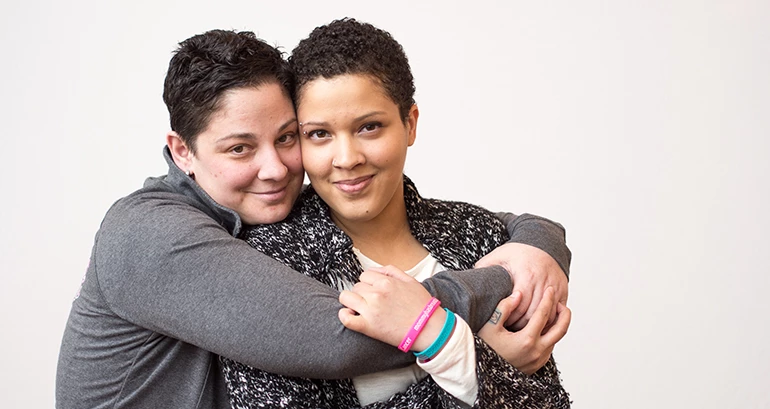Sex and Intimacy After Breast Cancer Diagnosis

Breast cancer impacts the most intimate parts of our lives. Diagnosis and treatment reduces natural libido and causes emotional and physical changes that can deeply affect young women’s sex lives.
Sex Life Changes During Breast Cancer Treatment
Surgery, radiation and chemotherapy cause physical changes that can affect sexual desire and enjoyment. Vaginal dryness, infections, pain during intercourse, loss of sensation, reduced libido, symptoms of menopause and worry about sexual encounters are all normal side effects of treatment.
These side effects might make you want to avoid sex altogether, but your doctors and nurses or a licensed sex therapist can help you manage them. Don’t be afraid to talk about it. Sexual problems don’t just go away—and some are easier to solve than others—but there are lots of resources to help you cope.
Body Image
Scars, the loss of breasts, changes to erogenous zones, weight changes and hair loss can contribute to feeling unattractive or less than sexy. Remember that feeling sexy is about self-esteem, and that can only come from within. Get to know your body’s needs, as they may be new or different than before you began treatment. Concentrate on your own well-being, and believe that you deserve to be admired, loved and able to experience intimate pleasure. If you are having trouble overcoming these issues, you may want to see a licensed therapist to help you work through them.
Dating with Breast Cancer
Body image and sexual issues can make dating more challenging. As you learn to accept change, you may also worry about how someone else will react to physical things like mastectomy scars or a reconstructed breast. It can be awkward to discuss your challenges—living with a life-threatening disease, sexual problems, the need for extra lubricants or potential loss of fertility.
You may wonder how and when to tell a new person in your life about your cancer and body changes. Don’t let cancer be an excuse for not dating or meeting people. Wait until you develop trust and friendship with new potential partners before talking about your cancer. Then, practice what you will say beforehand. If the reaction you receive is one of rejection or inability to handle the news, that’s likely not the person with whom you want to be.
Tips for a Healthy Sex Life After Breast Cancer
Communicate openly. Ask your partner how he or she feels. Listen and ask that your partner do the same, without judgment. Be careful to avoid misinterpretation. Know that it may be awkward because you are breaking new ground.
Intimacy means more than sexual intercourse. Even if you don’t enjoy sex like you used to, you can explore self-satisfaction, kissing, hugging and just being close. Strive to stay connected. Discover new ways to feel sexy and new ways to be intimate. Be open to change.
A note about birth control: If you are pre- or peri-menopausal, talk with your doctor about your type of breast cancer and the best birth control method for you.
Ask for help! You deserve to have an enjoyable sex life. Know that it might be different, and that is okay. These are great resources for reclaiming your sexual self after breast cancer:
- Started by survivor Barbara Musser in 2012, Sexy after Cancer was a movement dedicated to reclaiming sexuality after a diagnosis. While the site has been retired, we're proud to provide a home for Barbara's excellent content on sex and intimacy.
- Locate a certified sex therapist in your community.
- A pelvic floor certified physical therapist can provide invaluable tools.
Don’t be afraid of products, especially lubricants! If one doesn’t work, try another. A few good brands:
For more information download or order our Post-Treatment Navigator.
Connect with Others
Find women who know what it’s like to face breast cancer at a young age. The YSC community makes it easy to find and connect with other young survivors and co-survivors.
